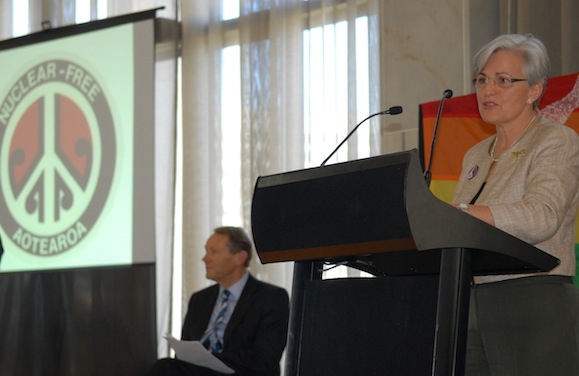On 31 May 2012, the New Zealand House of Representatives approved a cross-party parliamentary motion celebrating the 25th anniversary of the adoption of the New Zealand Nuclear Free Zone, Disarmament, and Arms Control Act.
New Zealand became one of the first countries in the world to legislate a ban on nuclear weapons when the nuclear-free law was adopted on June 8, 1987. The Act establishes New Zealand as a “nuclear free zone” and prohibits nuclear weapons and nuclear-powered vessels from entering New Zealand’s territorial waters and airspace. The anti-nuclear stance was taken under the leadership of Prime Minister David Lange in the face of strong international opposition, especially from the United States, which downgraded its defense relationship with New Zealand as a result.
In a statement welcoming the 25th anniversary of New Zealand’s “landmark” decision to abolish nuclear weapons the UN disarmament chief Angela Kane said the law and other anti-nuclear parliamentary measures are reminders of “the necessity of leadership and example-setting” in nuclear disarmament as well as “the value of multilateral dialogue and combined action.”
The parliamentary motion was introduced by Labour’s disarmament spokesperson, Hon. Maryan Street, who said New Zealand’s nuclear-free stance was “controversial at the time” but emphasized that it since “has morphed into an integral part of NZ’s identity and it would be a reckless and suicidal government which decided to tamper with the legislation now.” In acknowledging the legislation, which requires that New Zealand actively pursue nuclear disarmament, Street noted the need to “look forward” and “not stand still” in pursuing not only a nuclear-free country, but “a nuclear-free region, hemisphere and world.”
The motion therefore reaffirms New Zealand’s commitment to the achievement of a nuclear-weapons-free world and “commends” Norway’s decision to hold a conference in Oslo in 2013 on humanitarian consequences of nuclear weapons. It calls on the New Zealand government to provide its “highest support” for the conference “in order to build political momentum for a global ban.”
In the parliamentary question time that followed the motion, NZ Greens disarmament spokesperson, Kennedy Graham, asked the government if New Zealand would promote starting “immediate” negotiations” on a convention prohibiting the development, production, stockpiling and use of nuclear weapons.
The Minister of Foreign Affairs, Hon. Murray McCully, replied: “The position of successive New Zealand Governments has been one of general support for such a convention when circumstances are such that it has a realistic chance of success, and in the meantime to focus on practical measures to reduce nuclear dangers. I am advised that the prospects of successfully negotiating such a treaty at the present time would be poor. For that reason, at Government level internationally, there are no serious moves afoot to get negotiations on a convention under way.”
According to the Aotearoa New Zealand wing of the International Campaign to Abolish Nuclear Weapons (iCAN ANZ), the Minister’s statement reflects the same cautious position articulated by the Ministry of Foreign Affairs and Trade in a recent briefing to a recent meeting of the Foreign Affairs, Defence, and Trade Select Committee. The Committee is currently deliberating its response to an iCAN ANZ petition urging the New Zealand government to proactively cooperate with like-minded states on a fast-track process to abolish nuclear weapons. Sign the petition here.
Six months on, many are now questioning the official government line that there has been “no diminution of New Zealand’s substantive disarmament effort” with the assumption of the responsibilities of the Minister of Disarmament and Arms Control portfolio by the Minister of Foreign Affairs last December.
The New Zealand government is currently focused on supporting non-proliferation initiatives as well as on “mending frayed military ties” with the US through initiatives such as World War II commemorations and joint training exercises, following a gradually thawing in relations. New Zealand’s nuclear-free status has been acknowledged by the US through its invitations to New Zealand to participate in high-level nuclear security summits.
It remains to be seen if the United States will embrace the Norwegian initiative, but states such as New Zealand, with legislated bans on nuclear weapons, have no choice but to champion any and all measures aimed at abolishing nuclear weapons.
Photo: The parliamentary event was hosted by the chair and deputy chair of New Zealand Parliamentarians for Nuclear Non-Proliferation (PNND), Labour’s Maryan Street (front) and National’s Dr. Paul Hutchison (back).


Leave a Reply